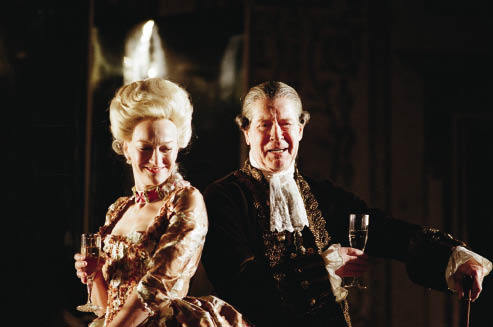A miracle at the Barbican. I reached the venue after a mere half an hour blundering around following directions from helpful staff. The main stage, which is so vast it feels like an open-air theatre, is the result of an alluring misconception of scale. You build a venue the size of the cosmos and you get universal art. But art finds its own measure. If the habitat suits the substance all should be well.
The latest delight here is an update of Sheridan’s The School for Scandal directed by Deborah Warner with a very classy cast and an absolute ton of money. Warner, a recent arrival at Obvious Island, wants us to know that today’s fashion-obsessed culture is just like the beau monde of the 18th century. Wow. Not much gets past you, eh, Debs? Everything is a mishmash. Mirrored cubes serve as seats. The costumes hop centuries at random. Scruffy boards printed with neo-Doric façades suggest the various locations.
To vandalise and rebuild a classic is an honourable artistic enterprise but this production entirely forgets that the script is a comedy. It needs tact, care and subtle handling if the magic of laughter is to emerge. And there was none. Not a chuckle, not a chortle. Not even a tsk. Just a witless parade of disjointed vanity projects.
I soon surrendered interest altogether and sat, bemused and vigilant, awaiting the next dippy distraction. What’s that? A burst of trance music to prod people awake. That? An idiot board, held up by an eponymous performer, explaining what the text makes obvious. And over there? Another irritated punter, 50 quid lighter, making a break for freedom.
Some critics have praised the actors. Me, too. I praise their forbearance. Alan Howard, as Sir Peter Teazle, gave a solipsistic performance, blanking out the surrounding jabber by pretending it didn’t exist. Rather dignified. John Shrapnel’s rich and sonorous tones, amplified by the empty seats all around me, were a delight to hear. But for every decent turn there were two or more shouty-pouty ego trips. One chap, I shan’t name him, acted entirely with his left forearm. I’ve seen him do it elsewhere. Before each cue, his outstretched hand jerks skywards in a semi-Heil Hitler and he forces out his words in a clotted simper. These tics are easily corrigible if anyone takes an interest. The good news for this cash-gobbling calamity is that a European tour beckons. We’re exporting boredom. Smart move. Perhaps they’ll take revenge and boot us out of their bankruptcy club.
The Acid Test is the latest runner from the Royal Court’s home-grown stable of thrusting young Sloanes. Anya Reiss’s flatshare comedy shows us three privileged girls on the verge of adulthood. Ruth, the daft one, has lost her boyfriend. Dana, the sexpot, is considering an office romance to advance her career. Jess, the deep one, is still a virgin at 21 and it hurts. The girls’ Friday night chat’n’booze session is interrupted by Jess’s Dad, newly exiled from home by his adulterous wife, begging permission to crash on the sofa.
This rather contrived opening releases a stream of extraordinary drama and comedy. Jess’s Dad becomes the flat’s agony aunt and starts to dispense wisdom to his newfound brood of lovelorn protégées. Ruth and Dana hero-worship him as a sage and treat his cynical banalities — ‘you are not special, you are not different, you are not unique’ — as oracular truths. This profoundly irritates his daughter, whose difficulties he not only can’t resolve but also manages to aggravate.
The play’s idiom is the superficial, the here and now. The characters speak in that jerky street-posh dialect which uses ‘like’ and ‘whatever’ as mental punctuation marks. To quote the dialogue without making it sound vacant would be impossible. Other charges might be laid. It’s an overextended sketch. It lacks dramatic weight. It represents a mayfly community unworthy of serious attention. But the accusations don’t stick. The girls’ internal lives are artfully realised and every single moment of the play explores some fresh angle of their pampered but difficult lives. The comic effects are never glib or forced but emerge from the absurd confusions of the everyday. It’s a blast, a real treasure, this show.
One row ahead of me sat Oliver Letwin and he evidently loved it, too. Applause from such a source should be cherished. Inviting a politician to the theatre is like asking a Tibetan to admire the Welsh hills. The cast do the production proud. Vanessa Kirby is superbly caustic as the gorgeous, self-loathing Dana. And Denis Lawson, as the Dad, has landed a peach of a part that he relishes to the last drop. Any complaints? Wrong venue. This belongs on the main stage.







Comments